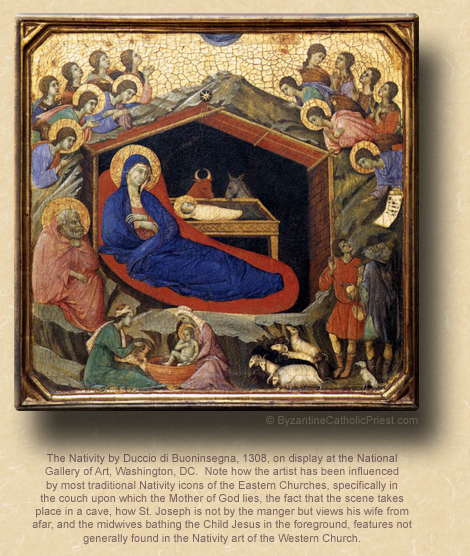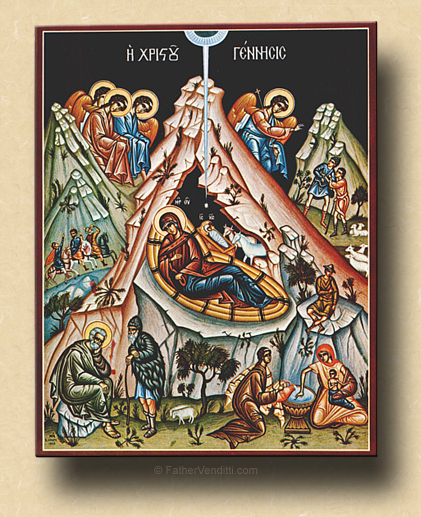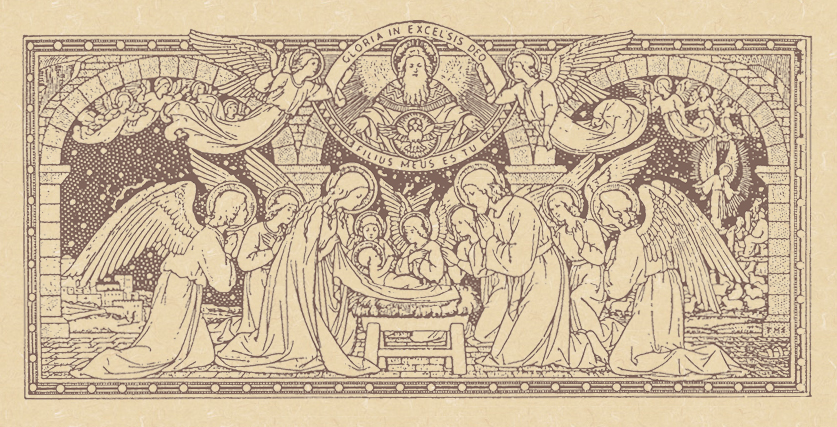The Real Christmas Tree.
The Nativity of Our Lord, God & Savior, Jesus Christ.
Lessons from the proper, according to the ordinary form of the Roman Rite, at the vigil:
• Isaiah 62: 1-5.
• Psalm 89: 4-5, 16-17, 27, 29.
• Acts 13: 16-17, 22-25.
• Matthew 1: 1-25
[or Matthew 1: 18-25.]
…and at midnight:
• Isaiah 9: 1-6.
• Psalm 96: 1-3, 11-13.
• Titus 2: 11-14.
• Luke 2: 1-14.
…and at dawn:
• Isaiah 62: 11-12.
• Psalm 97: 1, 6, 11-12.
• Titus 3: 4-7.
• Luke 2: 15-20.
…and during the day:
• Isaiah 52: 7-10.
• Psalm 98: 1-6.
• Hebrews 1: 1-6.
• John 1: 1-18
[or John 1: 1-5, 9-14.]
Lessons from the proper, according to the extraordinary form of the Roman Rite, at midnight:*
• Titus 2: 11-15.
• Psalm 10: 3, 1.
• Luke 2: 1-14.
…and at dawn:
• Titus 3: 4-7.
• Psalm 117: 26, 27, 23.
• Luke 2: 15-20.
|
At this Mass, a commemoration of Saint Anastasia is made by an additional Collect, Secret & Postcommunion added to those of the feast.
|
…and during the day:
• Hebrews 1: 1-12.
• Psalm 97: 3, 4, 2.
• John 1: 1-18.
FatherVenditti.com
|
8:46 AM 12/25/2018 — “She brought forth a son, her first-born, whom she wrapped in his swaddling-clothes, and laid in a manger, because there was no room for them in the inn” (Luke 2: 7 Knox).
That was, of course, from the Gospel lesson read last night at the midnight Mass. The Gospel for the midday Mass of Christmas Day is different, taken from the prologue of Saint John. I reproduce that passage to ask you a question: What think you of the innkeeper in Bethlehem? I've often felt sorry for him. Little did he know that he was turning away God. Of course, we like to think that had he known, he would have rushed to throw somebody else out of the hotel, to give the room to Mary and Joseph—or even, perhaps, give them his own room—something of which our Lord would not have approved, anyway.
The journey from Nazareth to Bethlehem in Judea was about three or four days, over rough terrain; and, with Mary being nine months pregnant, you can bet it was an uncomfortable trip. Perhaps, because of the bumpy ride, Mary was already in labor;—at the very least She must have been in tremendous discomfort—and, Joseph, being anxious to find some kind of shelter, decided to scope out the caves on the outskirts of town which some of Bethlehem's citizens had turned into stables for their livestock. We’re found of referring to it as a “manger,” whatever that is, but it was a cave. At least there, he thought, there would be some straw to keep the Baby and his Mother warm for the night, and a roof to keep out the rain.
What are we to think of the innkeeper? Is he guilty of turning away God that first Christmas night? Most of us would probably say, "No. How could he be? How was he supposed to know that this scruffy-looking man and his pregnant wife, both of them covered with the dirt of the road, were the parents of the Messiah?"  Wouldn't it be ironic if, thirty years later, that innkeeper was part of the crowd listening to our Lord tell the parable where the condemned say, "Lord, when was it that we saw thee hungry, or thirsty, or a stranger, or naked, or sick, or in prison, and did not minister to thee? And he will answer them, Believe me, when you refused it to one of the least of my brethren here, you refused it to me" (Matt. 25: 44-45 Knox). Wouldn't it be ironic if, thirty years later, that innkeeper was part of the crowd listening to our Lord tell the parable where the condemned say, "Lord, when was it that we saw thee hungry, or thirsty, or a stranger, or naked, or sick, or in prison, and did not minister to thee? And he will answer them, Believe me, when you refused it to one of the least of my brethren here, you refused it to me" (Matt. 25: 44-45 Knox).
It's an interesting question: to what extent do we excuse the conduct of the innkeeper—who was, after all, a business man—because Mary and her husband, didn't look much like the door through which God was coming into the world? Simeon had no problem recognizing the Messiah. When Joseph and Mary took Jesus to the temple in Jerusalem to be circumcised, old Simeon, whom everyone regarded as a pious kook, snatched the baby out of Mary's arms, lifted Him up toward heaven, and thanked God that he had been permitted to see the Messiah before he died. How did he know that? Did the child Jesus have the word "Messiah" tattooed on his forehead?
Thirty years later, when Jesus was walking along the shores of the Sea of Galilee, He stumbled across Simon and Andrew who were fishermen, and He said to Simon, "...henceforth thou shalt be a fisher of men" (Luke 5: 10 Knox). The Gospel says that they immediately dropped their nets and followed Him. And they followed Him for three years until His death and resurrection, and then they both died for Him. Why? If you were sitting at work, doing your job, and some stranger came up to you and said, "Forget all that, just come with me," are you going do it? Probably not, and chances are you would at least ask, "Who the heck are you?" But the Gospel doesn't say that Simon asked any such question, nor does it indicate that he had ever met or seen Jesus before; it simply says, "So, when they had brought their boats to land, they left all and followed him" (5: 11 Knox).
So, in our evaluation of the innkeeper, do we still wish to maintain that it wasn't his fault because nobody told him that it was God knocking at his door? Nobody told Simeon. Nobody told Simon and Andrew, and they accepted Jesus. You see, the whole life of our Blessed Lord on Earth is a series of meetings with people, some of whom reject Him and some of whom accept Him. The first person God meets during His stay on Earth is John the Baptist. When God was still in her whom, Mary went to visit Her cousin, Elizabeth, who herself was pregnant with the future John the Baptist.  And the Gospel says that as soon as Elizabeth heard Mary's greeting, the baby in her womb leaped for joy: even as a fetus, John accepted Jesus as God, and rejoiced. The second person Jesus meets is the innkeeper, who rejects Him. And so it goes throughout our Lord's life on earth. Many people encounter Jesus: some will accept Him, some will reject Him. And the Gospel says that as soon as Elizabeth heard Mary's greeting, the baby in her womb leaped for joy: even as a fetus, John accepted Jesus as God, and rejoiced. The second person Jesus meets is the innkeeper, who rejects Him. And so it goes throughout our Lord's life on earth. Many people encounter Jesus: some will accept Him, some will reject Him.
What about us? What think we of Christ? Do we accept Him or reject Him? Now, I could ask each of you reading this homily and ask you that question, and without hesitation you would tell me that you accept the Son of God. But, then again, so would the innkeeper, had he recognized Christ. The point is, he didn't. Assuming he was a Jew, he was looking forward to the coming of the Messiah like everyone else; only he didn't expect him to be born of a woman traveling with her husband from Nazareth. And when you read the Gospel through, you'll find that all the people who end up rejecting Jesus do so because He wasn't what they expected.
It is very easy to come to church at Christmas time and accept Christ as a baby lying in a crib. It's an image of God that doesn't repel us because it doesn't challenge us—so much easier to swallow than the image of the broken and bloody body of Christ hanging on the Cross, for example. There are no consequences to kneeling at the foot of the manger; there are dramatic consequences to kneeling at the foot of the Cross, because one who kneels at the foot of the Cross knows what the Gospel is all about.
When I was serving as pastor of a Byzantine Church in Pennsylvania, we had this tremendous icon of the Nativity of Our Lord which we would haul up from the basement every year to display in church. Those of you who have been visiting this web site for a number of years have seen me discuss Byzantine icons before, and know that everything in an icon is significant;—nothing is just a decoration—and, the traditional icon of the Nativity shows a lot of little details that you really have to look twice at: there’s an old man standing next to Joseph whispering in his ear doubts about his wife’s pregnancy; there’s a couple of midwives preparing a bath for the baby, and one of them is testing the temperature of the water with her hand to illustrate that our Lord’s humanity was real.  But the most significant detail in the icon is a small tree seen sprouting near the base of the crib. It looks like an artistic afterthought, but it isn't. It is the tree from which the wood of the cross would be taken thirty-three years later. That, my friends, is the paradox of Christmas: the sweet little Babe of Bethlehem, Whom wise men sought and of Whom angels sang, has come to earth to die. But the most significant detail in the icon is a small tree seen sprouting near the base of the crib. It looks like an artistic afterthought, but it isn't. It is the tree from which the wood of the cross would be taken thirty-three years later. That, my friends, is the paradox of Christmas: the sweet little Babe of Bethlehem, Whom wise men sought and of Whom angels sang, has come to earth to die.
Do we not gather each year to celebrate His birth with the Holy Sacrifice of the Mass, the memorial of His suffering and death? Do we not mark the birth of the Christ Child by offering to God the tortured Body and spilled Blood of His Son, that Son who is both Priest and Victim, who offers and is offered as a sacrifice for the remission of sins, whose adorable Body and precious Blood become our food and drink to strengthen us and make us one? Is this not why the Baby comes? Is it so strange, after all, that in gazing upon the manger we should think about the Cross?
Tomorrow we will celebrate the feast of the Church's first martyr, Stephen. His death is described in the Acts of the Apostles; Saint Paul is a witness to it. Is the proximity of these two days merely a coincidence? or is it, perhaps, a way the Church has of giving each of us a little nudge in the ribs during our Christmas joy, of reminding us why this Holy Child comes into the world? For He comes not for us simply to adore, but for us to follow as well; and, if we follow Him, there are consequences.
This little Child, so meek and so humble, at Whom we gaze so lovingly, will grow up to say and do many wonderful things. He will teach the people, He will heal the sick, He will give sight to the blind; He will cleanse lepers and feed the multitude; He will cast out demons and raise the dead. But above all of these He will do his greatest deed: He will die, and rise again, and because of this we will live, and have our sins forgiven.
If we would be like the wise men and give the Christ Child a gift this Christmas let it be this: Let us promise Him that He will not have done this in vain; that we will try, with all our might, no matter how hard it gets, to be worthy of His coming, that we will follow in His footsteps even when they lead up the mountain to Calvary. Let us promise Him, as we kneel in adoration at the foot of the manger, that we will not desert Him at the foot of the Cross.

* Cf. yesterday's post for the lessons of the Vigil in the extraordinary form, and an explanation of how the concept of a vigil differs between the two forms.
|

